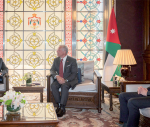You are here
Kadhimi’s race against time to save Iraq and himself
Aug 04,2020 - Last updated at Aug 04,2020
Almost 100 days after he was sworn in as prime minister of Iraq, Mustafa Al Kadhimi has taken his most important decision yet by calling for an early legislative election next June. His surprise move, seen as fulfilling one major promise to the protesters, has rattled Iraq’s entrenched political establishment. Kadhimi, who is not part of this establishment, is viewed as an outsider; something that helped him secure his position as a compromise choice following the outbreak of mass anti-government protests last October, which led to the resignation of his predecessor Adel Abdel Mahdi.
The former journalist and head of Iraq’s intelligence body soon found himself bogged down by a number of challenges; chief among them the defiance of pro-Iran Shia militias to disarm and join the national army. The killing of Iranian Gen. Qassem Soliemani and an Iraqi leader of the Popular Mobilisation Units (PMU) at Baghdad airport last January by a US strike has inflamed pro-Iran militias forcing parliament to call for early withdrawal of foreign forces from Iraq. Since then these militias, led by Iraqi (Kata’ib) Hizbollah Brigades, have claimed responsibility for shelling military bases and the Green Zone in Baghdad.
Kadhimi’s attempts to disarm the militias have been challenged by Iraqi Hizbollah, which made threats to his life. The prime minister wants to neutralise Iraq in any US-Iran showdown and curtail Tehran’s interference in Iraqi internal politics.
Moreover, Kadhimi wants to purge corrupt and disloyal military and security officials. This week, he fired key police chief after the release of a video showing the torture of a young protester by security forces. Since last October more than 550 protesters have been killed and an unknown number have disappeared. Last month, unknown assailants killed a prominent Iraqi political analyst and critic of pro-Iranian militias Hasehm Al Hashimi in front of his home. No one claimed responsibility but Hashimi had told friends that he had received death threats from pro-Iran militias.
Kadhimi’s mission to bring law and order back to Iraq is fraught with danger. The political establishment has benefitted from the state of lawlessness and social chaos. His only choice was to take the side of the protesters and call for early elections. But he has to navigate through a field of landmines if his goal to change the rules of the political game is to succeed.
Political parties could only welcome his decision, even though many will see the elections as a threat to them. But Speaker of Parliament Mohammad Al Halbousi called on Kadhimi to choose an earlier date as the country faces dire economic, social and political threats. Kadhimi needs time to resolve a number of issues before elections are held. He needs parliament to approve a new election law that would redraw the map of electoral districts and dilute sectarian influence and ensure transparency. He also needs to reform the federal court, the body that would ratify the results of elections, as well as the higher commission for elections which would oversee the process.
His endeavour to achieve all this will not be easy. Pro-Iran militias will continue to do their best to derail any genuine political process aimed at fighting corruption, undercutting Iran’s interference in Iraq’s affairs and disband unlawful militias. There is also the controversial issue of investigating those responsible for killing and abducting protestors, a matter that Kadhimi promised to resolve as early as possible.
The question is will he be allowed to fulfill his agenda? The fear is that he will be stepping on too many toes and that Iran and its minions will seek to undermine him and go as far as liquidating him. Kadhimi will be fighting on too many fronts and in the process he will be creating many enemies. But there is no other choice. Iraq is on the brink of collapse as citizens face daily hardships while the government appears unable to overcome mounting economic hurdles as well as containing the spread of the coronavirus.
The other pressing question is will Kadhimi be able to survive until June of next year and prepare the ground for fair and credible elections that would result in injecting fresh blood into the legislature? Halbousi believes that elections should be held sooner rather than later in order not to give traditional political players the time to prepare themselves to return.
The problem for Kadhimi, other than the threat of armed groups, is that he needs parliament to approve a new election law that would be a game changer while making sure that the legislature would eventually vote to dissolve itself. One pro-Iran parliamentary bloc made it clear that they would not support Kadhimi if he runs for a second term.
Kadhimi finds himself in an unenviable position as he challenges the political establishment that has long benefitted from the status quo. For the next ten months he will have to ensure his own survival as he seeks to implement a most difficult agenda. His failure will be catastrophic for Iraq and could push the country towards unrestrained chaos.
Osama Al Sharif is a journalist and political commentator based in Amman













